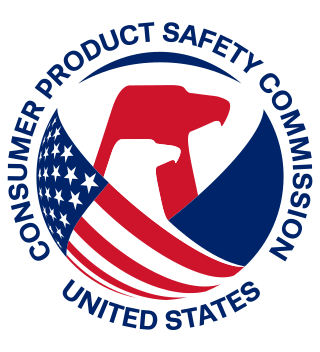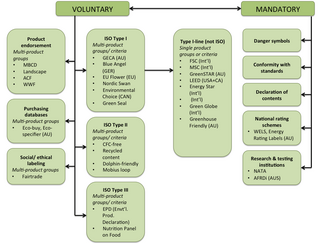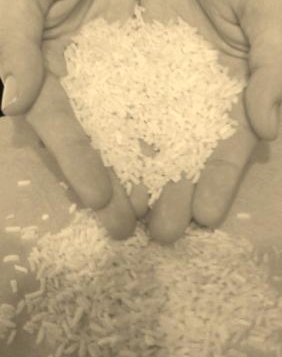
The Consumer Technology Association (CTA) is a standard and trade organization representing 1,376 consumer technology companies in the United States. CTA is led by president and CEO Gary J. Shapiro.

The video game industry is the tertiary and quaternary sectors of the entertainment industry that specialize in the development, marketing, distribution, monetization and consumer feedback of video games. The industry encompasses dozens of job disciplines and thousands of jobs worldwide.

Corporate average fuel economy (CAFE) standards are regulations in the United States, first enacted by the United States Congress in 1975, after the 1973–74 Arab Oil Embargo, to improve the average fuel economy of cars and light trucks produced for sale in the United States. More recently, efficiency standards were developed and implemented for heavy-duty pickup trucks and commercial medium-duty and heavy-duty vehicles.
As a federal agency, the National Aeronautics and Space Administration (NASA) receives its funding from the annual federal budget passed by the United States Congress. The following charts detail the amount of federal funding allotted to NASA each year over its history to pursue programs in aeronautics research, robotic spaceflight, technology development, and human space exploration programs.

The United States Consumer Product Safety Commission is an independent agency of the United States government. The CPSC seeks to promote the safety of consumer products by addressing "unreasonable risks" of injury ; developing uniform safety standards ; and conducting research into product-related illness and injury. In part due to its small size, the CPSC attempts to coordinate with outside parties—including companies and consumer advocates—to leverage resources and expertise to achieve outcomes that advance consumer safety. The agency was created in 1972 through the Consumer Product Safety Act. The agency reports to Congress and the President; it is not part of any other department or agency in the federal government. The CPSC has five commissioners, who are nominated by the president and confirmed by the Senate for staggered seven-year terms. Historically, the commission was often run by three commissioners or fewer. Since 2009, however, the agency has generally been led by five commissioners, one of whom serves as chairman. The commissioners set policy for the CPSC. The CPSC is headquartered in Bethesda, Maryland.

Extended producer responsibility (EPR) is a strategy to add all of the estimated environmental costs associated with a product throughout the product life cycle to the market price of that product, contemporarily mainly applied in the field of waste management. Such societal costs are typically externalities to market mechanisms, with a common example being the impact of cars.

Inez Tenenbaum is an American lawyer and politician who served as South Carolina Superintendent of Education and as chairperson of the U.S. Consumer Product Safety Commission. In 2016, she joined a law firm. She is a member of the Democratic Party.

Ecolabels and Green Stickers are labeling systems for food and consumer products. The use of ecolabels is voluntary, whereas green stickers are mandated by law; for example, in North America major appliances and automobiles use Energy Star. They are a form of sustainability measurement directed at consumers, intended to make it easy to take environmental concerns into account when shopping. Some labels quantify pollution or energy consumption by way of index scores or units of measurement, while others assert compliance with a set of practices or minimum requirements for sustainability or reduction of harm to the environment. Many ecolabels are focused on minimising the negative ecological impacts of primary production or resource extraction in a given sector or commodity through a set of good practices that are captured in a sustainability standard. Through a verification process, usually referred to as "certification", a farm, forest, fishery, or mine can show that it complies with a standard and earn the right to sell its products as certified through the supply chain, often resulting in a consumer-facing ecolabel.

The Game Manufacturers Association (GAMA) is a non-profit trade association based in Columbus, Ohio, dedicated to the advancement of the non-electronic social game industry – tabletop games, miniatures games, card games, collectable/tradeable card games, role-playing games, and live-action role playing games. Its members are game manufacturers, retailers, distributors, suppliers, conventions, clubs, and independent professionals related to the games industry.

The Energy Policy Act of 2005 is a federal law signed by President George W. Bush on August 8, 2005, at Sandia National Laboratories in Albuquerque, New Mexico. The act, described by proponents as an attempt to combat growing energy problems, changed US energy policy by providing tax incentives and loan guarantees for energy production of various types. The most consequential aspect of the law was to greatly increase ethanol production to be blended with gasoline. The law also repealed the Public Utility Holding Company Act of 1935, effective February 2006.

Food policy is the area of public policy concerning how food is produced, processed, distributed, purchased, or provided. Food policies are designed to influence the operation of the food and agriculture system balanced with ensuring human health needs. This often includes decision-making around production and processing techniques, marketing, availability, utilization, and consumption of food, in the interest of meeting or furthering social objectives. Food policy can be promulgated on any level, from local to global, and by a government agency, business, or organization. Food policymakers engage in activities such as regulation of food-related industries, establishing eligibility standards for food assistance programs for the poor, ensuring safety of the food supply, food labeling, and even the qualifications of a product to be considered organic.

The Association of National Advertisers (ANA) represents the marketing community in the United States. Its headquarters is in New York City and it has another office in Washington, D.C. ANA's membership includes over 600 companies with 25,000 brands that collectively spend over 400 billion dollars in marketing communications and advertising.

Toy safety is the practice of ensuring that toys, especially those made for children, are safe, usually through the application of set safety standards. In many countries, commercial toys must be able to pass safety tests in order to be sold. In the U.S., some toys must meet national standards, while other toys may not have to meet a defined safety standard. In countries where standards exist, they exist in order to prevent accidents, but there have still been some high-profile product recalls after such problems have occurred. The danger is often not due to faulty design; usage and chance both play a role in injury and death incidents as well.
The American Road & Transportation Builders Association (ARTBA) is a trade association representing the transportation construction industry in the United States and is based in Washington, D.C., United States.
The Institute of Scrap Recycling Industries (ISRI) is a United States–based private, non-profit trade association representing more than 1,300 private and public for-profit companies—ranging from small, family-owned businesses to multi-national corporations—operating at more than 6,000 facilities in the United States and 40 countries worldwide. Its membership is made up of manufacturers and processors, brokers and industrial consumers of scrap commodities, including ferrous and nonferrous metals, paper, electronics, rubber, plastics, glass and textiles. ISRI's associate members include equipment and service providers to the scrap recycling industry. Manufacturers and sellers of equipment and services—such as shredders, balers, cranes, cargo transporters, computer systems and more—also promote the scrap recycling industry through their membership in ISRI.
Counterfeit consumer goods are goods illegally made or sold without the brand owner's authorization, often violating trademarks. Counterfeit goods can be found in nearly every industry, from luxury products like designer handbags and watches to everyday goods like electronics and medications. Typically of lower quality, counterfeit goods may pose health and safety risks.

Tobacco has a long cultural, economic, and social impact on the United States. Tobacco cultivation in Jamestown, Virginia, in 1610 led to the expansion of British colonialism in the Southern United States. As the demand for Tobacco grew in Europe, further colonization in British America and Tobacco production saw a parallel increase. Tobacco use became normalized in American society and was heavily consumed before and after American independence.
The California Green Chemistry Initiative (CGCI) is a six-part initiative to reduce public and environmental exposure to toxins through improved knowledge and regulation of chemicals; two parts became statute in 2008. The other four parts were not passed, but are still on the agenda of the California Department of Toxic Substances Control green ribbon science panel discussions. The two parts of the California Green Chemistry Initiative that were passed are known as AB 1879 : Hazardous Materials and Toxic Substances Evaluation and Regulation and SB 509 : Toxic Information Clearinghouse. Implementation of CGCI has been delayed indefinitely beyond the January 1, 2011.

Moose Toys, also known as Moose Enterprises or The Moose Group, is an Australian-owned toy design, development, and distribution company founded in 1985. The company is headquartered Cheltenham, Victoria, Australia, has over 600 staff, and distributes to over 50 countries. They are most known for their collectable minifigure toy lines "The Trash Pack" and "Shopkins", and their associated francises.
Ronnen Harary is a Canadian entrepreneur, television and film producer, philanthropist, and billionaire. He is a co-founder of Canadian children's entertainment company Spin Master and the co-creator of PAW Patrol, a preschool series that airs in 160 countries. Along with childhood friend Anton Rabie, he founded Spin Master shortly after graduating from the University of Western Ontario, and they were co-CEOs of the company from 1994 to 2021. Harary is now chair of Spin Master's board of directors. He continues to oversee the company's long-term strategic vision and remains involved in business development and merger and acquisition activity.














